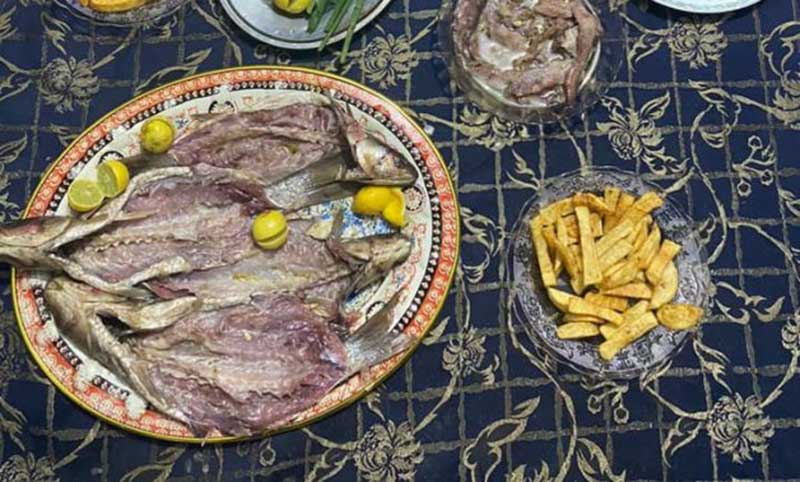Feseekh’s Role in Egyptian Culture
Introduction
Feseekh, a type of fermented and salted fish, holds a special place in the hearts of Egyptians. This delicacy, with its distinctive aroma and intense flavor, is more than just a dish – it’s a tradition that connects generations and serves as a cultural touchstone.Historical Roots of Feseekh
The origins of feseekh can be traced back to ancient Egypt, where it was considered a dietary staple. The ancient Egyptians used salt and the sun’s rays for preservation, a practice that laid the foundation for the fermentation process central to feseekh.The Significance of Feseekh
Feseekh is deeply intertwined with Egyptian culture and religion. It has long been associated with the spring festival of Sham el-Nessim, celebrating the arrival of spring and renewal. This dish symbolizes life’s cyclical nature and the importance of preservation.Feseekh’s Traditional Preparation
Preparing feseekh is an art that requires precision and expertise. Salted mullet fish are left to ferment in barrels for several weeks, allowing the fish’s enzymes to break down its flesh and intensify its flavor. The dish is then carefully deboned, seasoned, and presented with an array of complementary sides.
Feseekh in Modern Egyptian Society
In contemporary Egypt, feseekh remains a cherished delicacy. Families gather during Sham el-Nessim to enjoy this treat, fostering a sense of togetherness and continuity. Moreover, feseekh has made its way into modern cuisine, inspiring chefs to incorporate its distinct taste into new dishes.Controversies Surrounding Feseekh
Despite its cultural significance, feseekh has faced its fair share of controversies. Concerns about food safety and hygiene have led to debates on its consumption, prompting authorities to regulate its preparation and distribution more closely.Feseekh’s Culinary Influence
Beyond its traditional form, feseekh’s flavor profile has inspired culinary creativity. Chefs experiment with its unique taste in various recipes, creating a bridge between tradition and innovation.Feseekh in Egyptian Celebrations
Sham el-Nessim remains incomplete without a plate of feseekh. Families across Egypt share this dish as a symbol of unity, gratitude, and continuity, reinforcing the cultural values that have endured for centuries.The Cultural Symbolism of Feseekh
Feseekh’s pungent aroma and acquired taste hold deeper meanings. Just as the fermentation process transforms the fish, Egyptians see it as a metaphor for endurance and the ability to find beauty even in the most unexpected places.
Passing Down the Tradition
Elders play a vital role in passing down the art of feseekh preparation. This oral tradition ensures that the craftsmanship and cultural significance of the dish are preserved for future generations.Health and Safety Considerations
In response to health concerns, steps have been taken to modernize feseekh preparation while maintaining its authentic taste. This balance between tradition and safety reflects the cultural adaptability inherent in Egyptian society.Savoring Feseekh: A Personal Experience
Experiencing feseekh is not just about taste – it’s about embracing a centuries-old ritual. The initial hesitation often gives way to appreciation for the cultural heritage and the unique culinary journey it offers.Preserving an Age-Old Legacy
Efforts are underway to safeguard the feseekh tradition for generations to come. Cultural institutions and passionate individuals are working together to ensure its continuity in a changing world.Feseekh’s Global Recognition
Beyond Egypt’s borders, feseekh has garnered international interest. As people from diverse backgrounds explore its history and flavors, the dish serves as a testament to the power of culinary heritage to bridge cultures.Steam Deck vs Nintendo Switch: Which is Better for Gaming?
Conclusion
Feseekh’s role in Egyptian culture is multi-faceted. From its historical roots to its significance in celebrations, this fermented fish dish embodies the essence of endurance, tradition, and togetherness. It’s a reminder that cultural heritage can transcend time and bring people closer, even in a rapidly evolving world.Does Feseekh Contain Caffeine and Provide Any Health Benefits?
Feseekh, a traditional Egyptian dish of fermented fish, does not contain caffeine. However, discussing surprising benefits of caffeine in relation to overall health might lead to a better understanding of its potential positive effects. Despite not finding caffeine in Feseekh, it is interesting to explore how this compound can contribute to improved cognitive function, increased energy levels, and enhanced athletic performance.












